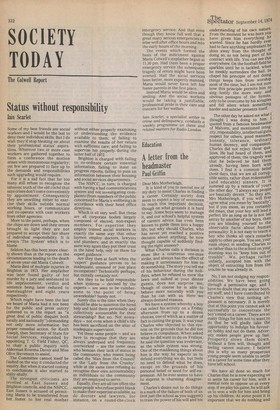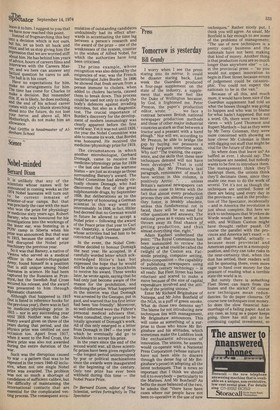Education
A letter from the headmaster
Paul Griffin
Dear Mrs Motherleigh,
It is kind of you to remind me of my duty to assist Charles in finding a career. Certainly society does seem to expect a boy of seventeen to reach this important decision, though on what grounds it is hard to say. Some boys seem to manage it, and our school's helpful system of careers advice has even been known to guide them into a happy life; but why should Charles, who has never yet reached a positive decision about anything, be now thought capable of suddenly finding the right answer?
What Charles calls a decision is More like a courteous one-man strike, and always has the effect of making it unnecessary for him to do something. The story you tell me of his behaviour during the holidays, when he refused to mow the lawn and sulked at your dinner guests, does not surprise me, though of course he is able to behave more naturally with you than he can with us. Here we always demand reasons. We have a system whereby a boy can select his activity on a Friday afternoon from up to a dozen choices, one of which as a matter of fact is cutting the grass. It was your Charles who objected to this system on the grounds that he did not believe in compulsion. When asked What he did want to do on Fridays, he said the question was irrelevant, as the whole system was wrong. One of the maddening things about him is the way he expects us to defend everything we do, but feels no need to defend what he does, except on the grounds of his personal belief or need for self-expression. All he ever seems to have to express is charming disagreement.
Charles's desire not to do things is a mark of the failure of both of us (not just the school as you suggest) to train the power of his will and his
understanding of his own nature. From the moment he was born you have given him everything be wanted. Since he has hardly ever had to face anything unpleasant he shies away from the thought of doing so, as not being part of his contract with life. You can see this everywhere. On the football field he sparkles until he is tackled, when he meekly surrenders the ball. In chapel his principle of not doing things keeps him from worship most of the time; but I am not sure how this principle permits him to sing lustily the more easy and obvious passages of the hymns, only to be overcome by his scruples and fall silent when something harder and subtler presents itself.
The other day he asked me what I thought I was doing to him. I quoted from a famous headmaster of Malvern, and mentioned integrity, responsibility, intellectual guts;
respect for others, good manners, honesty, tolerance, ordinary human decency, and compassion. Charles did not reject these qualities. He had heard of them, and approved of them; the tragedy was that he believed he had thern already, having been born with them. I find it a common belief these days, that we are all corruptible saints, rather than redeemable (and educable) sinners. It is summed up by a remark of yours the other day: "I always say people are basically decent." So they are, Mrs Motherleigh, if you will first agree what you mean by 'basically', but if you mean, as you certainly did mean, that your boy will lead a perfect life as long as he is not led astray by another of my boys, then you are blinding yourself to the observable facts about human personality. It is not easy to teach a boy who thinks all one's remarks apply to other people. You see, your main object in sending Charles to us rather than to the school on your doorstep was to "keep him out of trouble". We, perhaps rather unfairly, accepted him with the object of extracting him from the trouble he was already in.
No, I am not dodging my responsibilities. We have been going through a permissive age, and I have no doubt that my senior boys, my staff, and I have contributed to Charles's view that nothing unpleasant is necessary. It is merely that at this point you cannot ask us successfully to concentrate the boy's mind on a career. There are so many things for him not to want to do that he will gladly take the opportunity to indulge his favourite hobby and not do them. Adversity makes people grow up fast. Prosperity slows them down. Without a firm will, thought and feeling cannot mature; I believe this is why so many prosperous young people seem unable to settle on a career for some time after they have left school.
We have all done so much for Charles that he is now expecting us to settle his career for him, with a mental note to oppose us at every step. If we play his game, he will ask us to woo a wife for him and bring up his children. At some point it is important that we do nothing and leave it to him. I suggest to you that we have now reached this point.
Instead of frogmarching this boy into a decision which is not ours, but his, let us both sit back and relax; and let us stop giving him the ni1Pression that we are worried stiff about him. He has behind him years of advice, hours of careers films and interviews with the Careers Master; and we here can answer any factual question he cares to ask. The ball is in his court.
Have no expectations for him, make no arrangements for him. The time has come for Charles to make a decision. But remember this. If, as is likely, he does nothing, and the end of his school career comes with only a blank stretching ahead into the future, do not lose Your nerve: and above all, Mrs Motherleigh, do not make him an allowance.
Paul Griffin is headmaster of Al-' denham School



































































 Previous page
Previous page